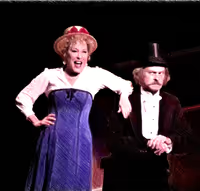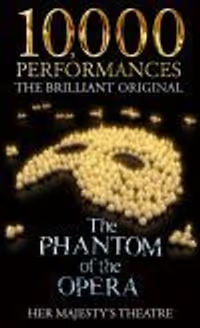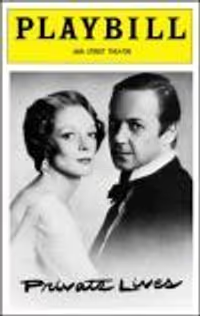Charlie and the Chocolate Factory
#50Charlie and the Chocolate Factory
Posted: 5/23/13 at 7:39pm
Thanks very much for that report/review, DeNada!
I understand what you're saying, and I want to ask a question that will involve a SPOILER ALERT!!!!!! (lots of exclamation points) with your answer ...
When you say Charlie and Grandpa Joe have very little to do in the second act (other than say "Is he mad?"), I get that.
One of the ways the 1971 screenplay fixed that (and I believe they DID fix it) was to give them something a little mischievous to do. They didn't steal anything, but they went somewhere they weren't supposed to go (the Fizzy Lifting Drinks scene). That helped make them more real, but it was the payoff from that scene at the end that really fleshed them out.
When Charlie is the only one left, and he walks into Wonka's office, and Willy Wonka freaks out on him, accusing him of being a thief and a liar and tells him he "gets nothing!" The reaction from first Grandpa Joe ("You're a crook!" "Dashing a little boy's dreams!") and then Charlie's own reaction, which is to give the Gobstopper back to Wonka before he leaves ... that whole character arc gives them something to do, somewhere to grow and change .. it was an improvement over the novel (sorry, Mr. Dahl, but those characters are bland in the second half of the story without it).
So ... my longwinded question to you is ... did they put any of that into the stage show, or anything LIKE that? Do they have any confrontational moment? Is Charlie put to any test? Does Grandpa Joe get to rise to any occasion in Charlie's defense?
Is Wonka mysterious or predictable as a character?
(Another great addition to the movie was something Gene Wilder put in, and he told the producers and director he would NOT do the film unless they agreed to it. The moment when we first see him and he limps out with a cane, slowly down the walkway, and then suddenly turns a somersault ... it was Wilder's idea, because he said, from that moment on, the audience won't know what to think of this man. They won't know if his full of crap, or serious, or trying to be funny, or just insane. Wilder said he wouldn't do the film unless he could have that initial moment ... and they agreed.)
Stuff like that is important for this story. It can make the characters resonate far beyond the telling of the tale.
blocked: logan2, Diamonds3, Hamilton22
#51Charlie and the Chocolate Factory
Posted: 5/23/13 at 7:52pm
Jonwo---I was writing my (longwinded) post when you posted your thoughts.
So funny we were thinking the same thing!
I'm not married to Fizzy Lifting Drinks, by any means, but it did solve a problem in the lack of character arch and in the plot for the main characters in the second half. I hope they realize that without it, they still have that problem.
blocked: logan2, Diamonds3, Hamilton22
Jonwo
Broadway Legend Joined: 3/16/06
#52Charlie and the Chocolate Factory
Posted: 5/23/13 at 8:09pmThe Fizzy Lifting Drink I agree gave Charlie and Grandpa Joe more to do and helped the ending a bit, I think against great characters like the children and Wonka, Charlie is boring because he has to be the one who left at the end and gets the factory and so Dahl didn't want him getting involved in mischief in the factory.
#53Charlie and the Chocolate Factory
Posted: 5/23/13 at 8:59pm
In the original novel, Charlie is so bland that he is nearly invisible, but it is mentioned as a survival skill that he has cultivated to survive as a penniless child in a destitute family. He hated running, jumping and playing because it burned off the energy he needed to survive.
So his "boring" character became a Dahlian twist, instead of just "Marty Stu" qualities.
#54Charlie and the Chocolate Factory
Posted: 5/23/13 at 9:07pm
The thing that works well in the Dahl novel is that the whole story is basically a satire.
So Charlie is more of a caricature than a character, just like the other kids. His whole family is almost laughably poor. Four grandparents in one bed, and they haven't set foot on the floor in 20 years. Cabbage water for dinner. (Not cabbage, but the water from the cabbage.)
Charlie Bucket is as much of an exaggeration as Veruca Salt or Mike TeeVee.
But not only is that difficult to translate to the screen, it presents the problem of having an entire story told where nobody involved is realistic, including the protagonist. So, they gave Charlie a foundation in reality and an emotional "heart" to the story to make it accessible.
Just like someone else pointed out here, Dorothy is the "real" person in the world of odd and crazy characters in The Wizard of Oz. But she is the "reality" by which we can all see the insanity.
blocked: logan2, Diamonds3, Hamilton22
#55Charlie and the Chocolate Factory
Posted: 5/23/13 at 9:23pm
Personally I can't stand the Charlie in the 70s version and won't start watching the movie until Gene Wilder makes an appearance.As for the fizzy lifting drinks, I root for the fan.
I am so happy to hear they scrapped most of the score too. I can't wait to see what Mr Shaiman does with it
Jonwo
Broadway Legend Joined: 3/16/06
#56Charlie and the Chocolate Factory
Posted: 5/23/13 at 9:29pmI think some main characters in fiction are unintentionally boring or bland because other characters are more colourful or more interesting. This is especially true in sitcoms where the supposed lead is outshone by the supporting character.
#57Charlie and the Chocolate Factory
Posted: 5/23/13 at 9:40pm
Part of that "unintentionally boring" aspect is to make the protagonist in a fantasy the "window" by which others can see this strange world. If the character is too crazy or showy or too specific in any way, it removes some of the accessibility for a wider audience.
I agree with that, only to a point. I don't believe the character should be just a cypher or an observer. They have to take an emotional journey to go with the physical journey, they have to be an active participant, or the story (as clever as it may be) won't resonate. Nothing will have changed. Nothing will have been learned. And it will quickly fade from audiences' minds.
blocked: logan2, Diamonds3, Hamilton22
#58Charlie and the Chocolate Factory
Posted: 5/24/13 at 6:53am
Here's a recap of a review from someone who saw it and reported back to Riedel.
The first act is “a little static” and “gray.” It’s set in Charlie’s drab house and neighborhood and moves sluggishly because of too many plot points (easily fixed with some judicious trimming). But it ends with a flourish — and a fine song by Marc Shaiman and Scott Wittman — when Willy Wonka first appears.
Act 2 is swifter and much brighter than Act 1. The sets are big and colorful, and there is ample use of projections, which, as they did in Andrew Lloyd Webber’s “The Woman in White,” can sometimes induce nausea among theatergoers.
My source admires much of the show but says it still needs to find its heart: “It feels cold and mechanical. It needs a little more magic.”
Link
#59Charlie and the Chocolate Factory
Posted: 5/24/13 at 8:31am
That last line summarizes Matilda. And if this is any indication of what's to come, then I'm very disappointed.
Dahl's books, although dark, have a heart. Matilda as a musical doesn't. It's a big, cold musical.
Roscoe
Broadway Legend Joined: 5/15/03
#60Charlie and the Chocolate Factory
Posted: 5/24/13 at 9:06am
The novel has no test for Charlie. It can be argued that no test is arranged for Charlie out of a lack of time: Charlie finds the ticket the day before the tour is scheduled to take place. But that's not much of an argument. There is no test specifically targeted at his weaknesses, because Charlie quite simply has none. He wins simply by showing up. He’s the last survivor of the tour, so he wins the prize, plain and simple. It is also shown very clearly and spelled out very specifically that the Buckets are in serious danger of literally starving to death. The novel is more concerned with setting up Charlie as a good kid, and then wiping out a bunch of rotten kids in entertaining ways. It almost came as a surprise to find myself thinking of the possibility of Charlie making it to the end simply by being more devious than the others, rather than more honest and decent and pure.
The 1971 film adds the Everlasting Gobstopper gambit. Upon finding the Golden Tickets, a figure claiming to be Arthur Slugworth, a business rival of Wonka’s, appears to offer the children a deal: if the children smuggle an Everlasting Gobstopper out of Wonka’s factory and hand it over to him, they will get lots of money. The test seems aimed particularly at Charlie: the fake Slugworth promises lots of good food and comfort for Charlie and his family in return for the Gobstopper. Thus, when Charlie hands over the Gobstopper to Wonka at the end of Wonka’s frightening fake tirade, Charlie’s honesty is proven and he is worthy of winning the Great and Glorious Jackpot.
Burton’s film eliminates this particular gambit. As in the novel, Charlie wins the until-then secret Grand Prize (a trip in the Great Glass Elevator and the Factory itself), but he turns it down when Wonka won’t let Charlie’s family come with him. Some rather heavy-handed moralizing about the importance of family follows, and Charlie helps Wonka mend fences with his own father who has been shown in flashbacks to be a cold-hearted dentist who won’t allow the young Wonka to eat candy or pursue his dream of being a candy maker. After the reconciliation, we are told that Wonka repeats his offer, and Charlie says yes this time, on condition that his family comes with him, to which Wonka assents.
The final scene of the film is very curious: Wonka and Charlie arrive in the Bucket family home after a hard day’s work, Wonka is asked to stay for dinner, the table is spread with family dinner trimmings like turkey, side dishes, etc. The camera pulls back though a broken window, and it is revealed that the Bucket family home has been transported as is, holes in the wall and poor but honest squalor and apparently permanent winter intact, to the Chocolate Room in the Wonka Factory. This has always bothered me. Why the giant salt-shakers pouring snow over the house? Why is the great free-flowing chocolate river, a marvelous symbol of Wonka’s demented creativity, shown to be frozen over? Why are the Buckets kept living in that collapsing house? If Wonka can keep his factory extra warm for the Oompa Loompas, why does he make it cold for the Buckets? And where is Dr. Wonka in this sudden orgy of frozen domestication?
The problem is that the big Pro-Family message of the film has nothing to do with the film itself. Mike Teavee, Augustus Gloop, Veruca Salt and even the apparently single-parented Violet Beauregard all come from families, too, and all are ghastly, largely because of the families they have who either encourage their worst qualities or do nothing to curtail them. Wonka’s own family life (elements of which are shoe-horned in to the plot solely to create a final reconciliation between father and son) has been a disaster.
That this works at all is largely due to the skill and warmth with which Burton has established that the Bucket family is a pretty cool bunch of people: Noah Taylor and Helena Bonham Carter manage to convey a real devotion to each other and to Charlie and to their parents, the grandparents who never leave their beds. These opening scenes of the Bucket family could be used to dispel any criticism of Burton’s skill with actors. The warmth and affection among the 7 members of the Bucket household are beautifully presented, without descending into Spielbergian Ickiness.
Credit must also go to Freddie Highmore, the frighteningly skilled young actor who plays Charlie. He is able to encourage sympathy without getting sticky, but even he can’t help sounding rather self-righteous and judgmental when he prattles on about his family and how they always make him feel better and all that.
I don't know if any of this really diminishes the film, or not. There's a lot to enjoy in Burton's film, but I don't think it comes near eclipsing the first version. I much prefer the simplicity of the original film's ending. When Wonka offers Charlie the warning about remembering what happened to the man who suddenly got everything he always wanted (he lived happily ever after, it turns out) I always get a little verklempt.
#61Charlie and the Chocolate Factory
Posted: 5/24/13 at 9:26am
Nicely put, Roscoe!
I love that last line in the 1971 movie, as well, and it's great to hear the director talk about it on the DVD.
When they were filming that last scene in the elevator, the line wasn't in the script. Mel Stuart (the director) realized, as they were filming, that something critical was missing. Apparently, the writer (an uncredited David Seltzer, who had been called in to revise Roald Dahl's screenplay) had gone away (on a planned vacation, I believe) and wasn't available for a discussion. Mel had him tracked down on a mountaintop while skiing, and finally, they got him on the phone. Mel explained from the set that this movie really "had no ending" and he desperately needed a last line. The cameras were set up and they were ready to roll.
David Seltzer, over the phone, while on vacation, improvised that last line on the spot. Mel turned to Gene Wilder and repeated it. They both nodded and smiled and knew they had their ending at last.
Willy Wonka: "But Charlie, don't forget what happened to the man who suddenly got everything he always wanted."
Charlie Bucket: "What happened?"
Willy Wonka: "He lived happily ever after."
blocked: logan2, Diamonds3, Hamilton22
#62Charlie and the Chocolate Factory
Posted: 5/24/13 at 9:27am
One of the things you point out, Roscoe, is that both film adaptations found a way to give Charlie a heart, so he wasn't just a caricature like the others.
They each solved it in different ways, but they solved it.
blocked: logan2, Diamonds3, Hamilton22
#63Charlie and the Chocolate Factory
Posted: 5/24/13 at 9:39am
Having never read the book I'm really enjoying all the posts here. As always Besty and Roscoe have excellent points and opinions.
I will say that I love the original film (which has everything to do with Gene Wilder).
I do hope the musical tightens the first act and gives Charlie some more complexity.
DeNada
Broadway Star Joined: 7/7/07
#64Charlie and the Chocolate Factory
Posted: 5/24/13 at 9:44am
Sorry for the delayed reply, sleep and work get in the way.
best12, Grandpa Joe does threaten to fight Wonka at the end of the tour when he says there's no further prize of a lifetime of sweets for Charlie - Wonka says that the Everlasting Gobstopper is the prize, because it will last his entire lifetime. Charlie intervenes and says that the Gobstopper is wonderful and all he needs and thanks Wonka for his time - it's another example of Charlie being saintly.
At the same point, Wonka makes a joke of the story - he says "oh, we've been on a wonderful journey, haven't we, we've all learnt something." Of course Charlie hasn't - maybe the other characters did? Or maybe they've died horribly, in the case of Veruca. Not that it matters.
I think Hodge's Wonka is pretty predictable. Although he's a bit bonkers, there's none of the menace of Wilder or total lunacy of Depp. He's like a charming, slightly odd uncle.
One big plot element that's not in the book or the films - these are FAIRLY MASSIVE SPOILERS, by the way - is....
SPOILER SPACE
SPOILER SPACE
SPOILER SPACE
SPOILER SPACE
SPOILER SPACE
SPOILER SPACE
SPOILER SPACE
that Wonka has planned the whole thing from the outset for Charlie to inherit the factory. Wonka disguises himself as a beggar who loiters around the dump where Charlie lives - there's a travelling sweets shop that visits the dump which is where Charlie buys the winning chocolate bar, and Wonka is there at the time. Charlie also sends Wonka a letter (very "Perfect Nanny" from MARY POPPINS) with lots of wonderful ideas for sweets he could make, which it's revealed Wonka has read and taken inspiration from near the end of the second act. So rather than Charlie winning entirely through being the perfect little boy, Wonka has basically set the whole thing up in his favour.
As far as comparisons to MATILDA go, I personally think Matilda is the stronger show. However, I say that as someone who likes Matilda a lot - I don't think it's the second coming of musical theatre as many UK critics did but I think it's a much cleverer show than Charlie and generally much more engaging.
When Wonka sings Pure Imagination it's a lovely emotional moment, but most of the pleasure of Charlie is in watching the grotesqueries of the other children and seeing them get their comeuppance. Maybe that's cold? But I don't think it's mechanical.
#65Charlie and the Chocolate Factory
Posted: 5/24/13 at 9:49am
I don't think Dahl intended for ANY of the children to die (not even Veruca. In the Wilder film, when she's sent down the chute, Wonka says today isn't the day for the incinerator to be on or something.) Dahl may have been dark, but he doesn't kill his child characters typically (The Witches is the closest to this. I'd love to see that adapted, actually, but who could play the Grand High Witch as well as Angelica Huston? And pulling off the metamorphosis would be really tough.).
Do they imply that any of the kids die in the musical?
#66Charlie and the Chocolate Factory
Posted: 5/24/13 at 9:55am
Wow, thanks for that explanation, and I appreciate the SPOILER ALERT, which I will now respond to.
SPOLIER SPACE
SPOLIER SPACE
SPOLIER SPACE
SPOLIER SPACE
With the setup you've described, there is nothing really at stake in this story. No gamble, no surprises, and no real reward, because it's all preplanned from the start! What a letdown dramatically! Even if Grandpa Joe confronts Wonka, and Charlie shows he has a good heart near the end, IT DOESN'T MATTER, because Wonka has already fixed his contest so that Charlie will win. That pretty much lessens the impact of the entire second act. Wow. Talk about self-sabbotage.
EDIT: Not only that, but by showing Wonka's plan and motivation from the beginning, there is no mystery to his character at all.
blocked: logan2, Diamonds3, Hamilton22
#67Charlie and the Chocolate Factory
Posted: 5/24/13 at 9:58am
As far as any of the kids dying, they are all seen exiting the factory at the end (from the POV of the glass elevator). That's in the book and in the Burton movie, so none of them die.
But I do love some of the sick, twisted Gene Wilder lines of dialogue as he watches the kids meet their fates: "The suspense is killing me! I hope it will last."
blocked: logan2, Diamonds3, Hamilton22
Jonwo
Broadway Legend Joined: 3/16/06
#68Charlie and the Chocolate Factory
Posted: 5/24/13 at 11:48amCharlie gets the factory in the book by not succumbing to the temptation which is what happens to the other four children, Augustus' gluttonous leads to falling into the river and sucked in the pipe, Verucas being a spoilt brat leads to her being attacked by the squirrels and chucked down the chute, Violets chewing leads to her ballooning and turning purple and Mike because of his TV obsession gets shrunk.
DeNada
Broadway Star Joined: 7/7/07
#69Charlie and the Chocolate Factory
Posted: 5/24/13 at 12:00pm
While none of the kids die in the book or the film, it's a little ambiguous in the stage show.
For instance, Wonka tells the Buckets and the Teevees that the garbage chute that Verucca has fallen down normally goes to the sewage treatment plant - but today it's been diverted to the incinerator. In the book and the films it's normally the other way round, or the incinerator hasn't been lit, or similar. Likewise, Wonka tells Mrs Gloop to rescue Augustus before he's caramelised and his bones get in the sweets - but we never see him again, so who knows what happened to him?
Charlie in this version does succumb to temptation - he peeks in Wonka's book of wonderful ideas in the final room. But of course that's the "right" kind of temptation - Wonka tells him that what makes him so special is that "he's always making something out of nothing".
#70Charlie and the Chocolate Factory
Posted: 5/24/13 at 12:45pmThe blandness of Charlie has always been an issue in every version of the story, but that isnt an uncommon problem in stories with kids as leads. Oliver, for example, is surrounded by far more interesting and better written characters. And I would actually say Matilda is fairly boring, and I felt that Matilda lacked any heart, so I'm sad to see Charlie has the same criticism
#71Charlie and the Chocolate Factory
Posted: 5/24/13 at 12:55pm
See even though Dorothy is a bland character, her "wants" change throughout her arc. She goes from wanting somewhere else, to wanting to go home, to wanting to get the broom to wanting to go back home. I don't recall Charlie having that in the book or the new film. None of the kids know there is a prize at the end other than the lifetime supply of chocolate..but that was awarded with the ticket right? So his family will have "food" at least.
The additions of the fizzy scene and Slugworth are genius really. They totally solved the problem at least for the film. Isn't it even Grandpa who leads Charlie astray?
For a musical you really need the protagonist to want something.. once he's inside his needs/wants need to change.
Concerning the beginning of the original film, I find it just plain wonderful. My heart still sinks when Charlie is defeated opening those first few bars. I haven't read the book in years, but I remember being more or less upset at the changes in the film, but it's a different medium and they made an incredible timeless film.
#72Charlie and the Chocolate Factory
Posted: 5/24/13 at 1:02pm
I think Charlie wants something-I haven't read that book in quite awhile. But, I'd always thought he wanted a better life for his family. And adventure.
What gets me in the Gene Wilder film is when someone offers him money for that ticket, and he thinks about it and says to his family that he's going to sell it and his Grandpa Joe tells him not to, because "money, there's a lot of that, but those tickets, there are only five in the world. What kind of fool would give that up for money?"
#73Charlie and the Chocolate Factory
Posted: 5/24/13 at 1:24pm
"The suspense is killing me! I hope it will last." is wonderful -- as it should be, since it is lifted almost verbatim from Act III of The Importance of Being Earnest.
Gwendolen: The suspense is terrible. I hope it will last.
As my late partner, a costume designer, used to say, "If you're going to steal, steal from the best." I've always wondered from whom he stole that line.
Updated On: 5/24/13 at 01:24 PM
Roscoe
Broadway Legend Joined: 5/15/03
#74Charlie and the Chocolate Factory
Posted: 5/24/13 at 1:32pm
"What gets me in the Gene Wilder film is when someone offers him money for that ticket, and he thinks about it and says to his family that he's going to sell it and his Grandpa Joe tells him not to, because "money, there's a lot of that, but those tickets, there are only five in the world. What kind of fool would give that up for money?"
That little exchange is in the Burton remake, not in the 1971 version. And it is actually the other Grandfather who says it to Charlie.
Videos









